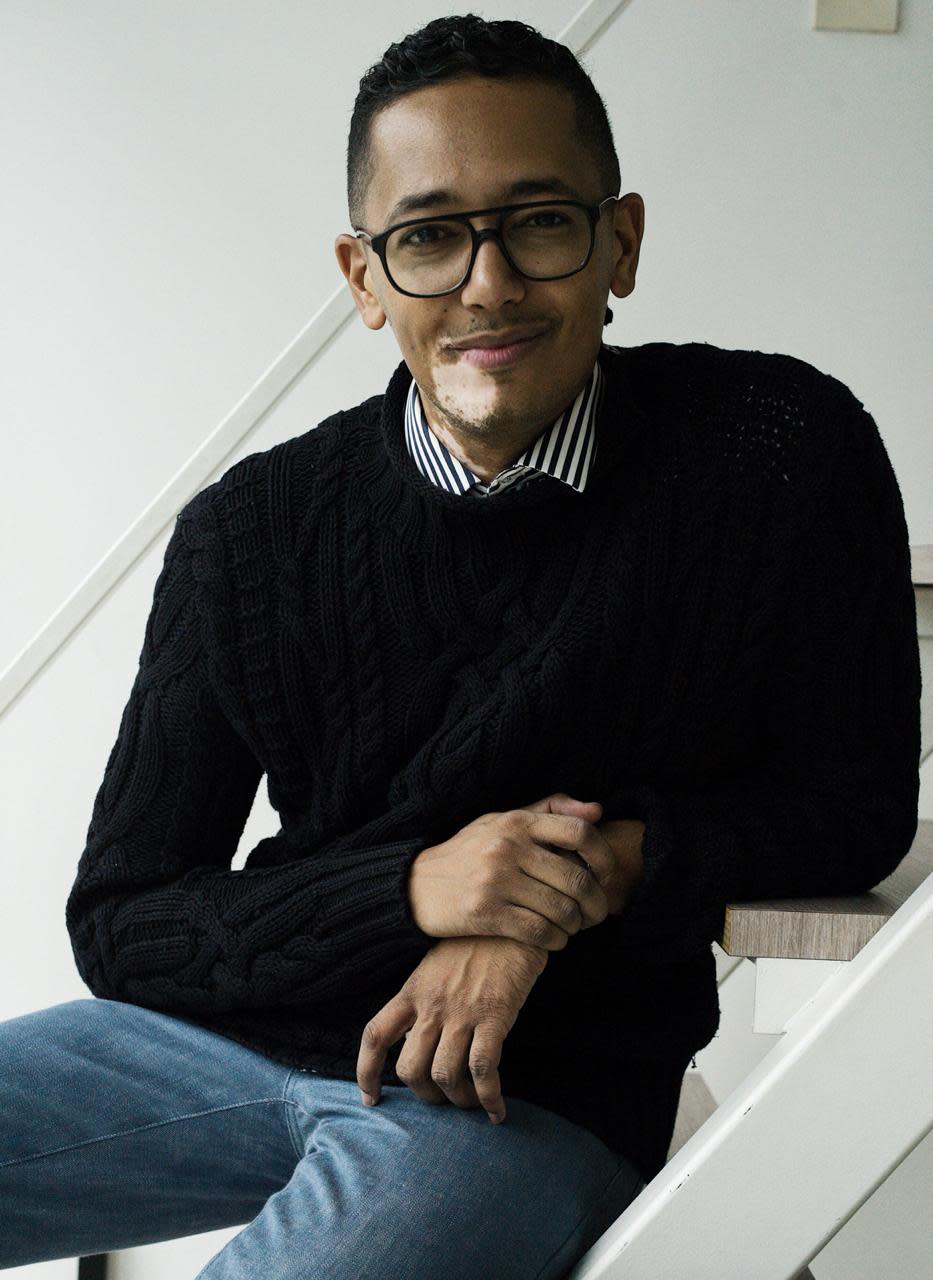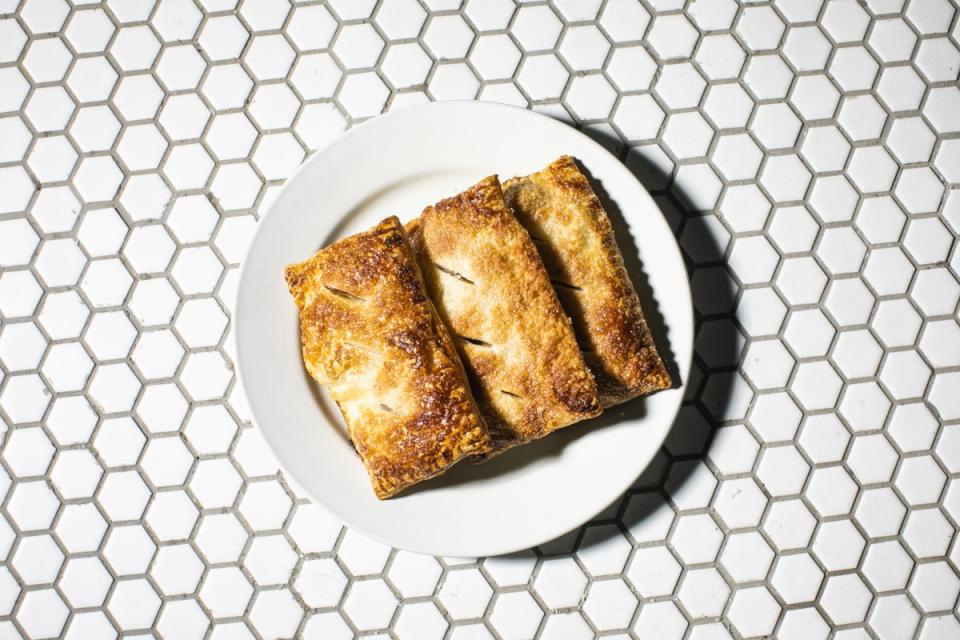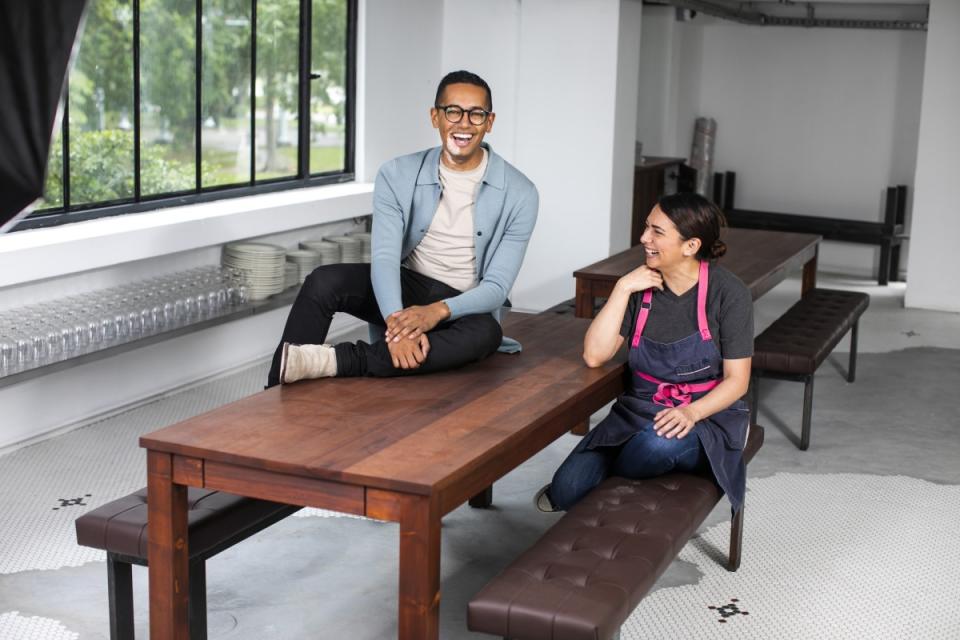INTERVIEW: Gibran Baydoun of Lucali BYGB — “The success of restaurants, I believe, comes down to intentionality”

Sometimes, as I sit sipping Teh-O at Heavenly Wang, enjoying the chilly air of June, I often wonder about how to approach interviews with people in the food industry of Singapore. It is such a precarious balance between featuring the restaurant that inspired the personality and allowing the spirit of the individual to shine—which at times dazzles brighter than the physical premises itself.
Which brings me to Gibran Baydoun, who most recently teamed up with chefs Mark Iacono and Ariana Flores to launch Lucali BYGB (that’s By Gibran Baydoun), a sister outlet to the original in New York City. Lucali in Carroll Gardens is famous for being notoriously painful to visit—they don’t take reservations, and you’d have to queue just to put your name on a waiting list that spans anywhere between one to five hours. All this, for a slice of the best pizza in NYC. Now, take that and pair it with a hospitality consultant and you might be forgiven for expecting nothing but the best.
The man at the centre of this strategic union is Gibran Baydoun, which, if previous interviews were to be believed, described himself as a maestro—the person responsible for weaving the various aspects of an orchestra into a cohesive and, for lack of a better word, sound whole. He traipses around Singapore in sharply pressed suits, turtleneck tops, and vintage brooches ala Margaret Thatcher, but probably with none of the infamy and all of the drive.
Before arriving in Singapore, Gibran Baydoun’s previous places of employment include the Hillstone Restaurant Group, Ralph Lauren, Momofuku Ko, and Booker and Dax. In Singapore, he was instrumental to the success of MBS’ Adrift by David Meyers, and more recently, private members’ club, 1880 at Nanson Road. WIth intentional hospitality as his mantra, I wanted to draw the curtains and take a peek behind the personality of BYGB and find out his thoughts on the future of dining in Singapore.
How would you describe what you do to someone you're meeting for the first time?
Funny enough, I get asked this question a lot, especially by people who aren't in the restaurant business and always had a hard time explaining in a very real sense what my day actually looks like. The best way I can think to describe it is as a conductor of a symphony, or a maestro. You are making sure all of the moving parts are playing in harmony at the same tempo and balancing each section. I try to set the tone and spirit of the restaurant while making sure our culture of hospitality is infectious.
But then also, on the other hand, I am just trying to feed people and give them something to drink too.

What spurred your relocation from New York City to Singapore 4.5 years ago and, in hindsight, what has been the greatest lesson you've learned from the move?
I was 27, and like many Americans, had never used a passport. I always thought globally but never put travel before work and felt like New York was the city I was made for. It was precisely that comfort that let me know it was time to get out of my comfort zone and experience something new. I thought it would be a year, but I have never felt so welcomed and embraced by a new home and knew I wanted to play my own part in what makes Singapore hum.
How did the phrase 'Hospitality on Purpose' come about and what is its significance in the way you live your life?
I have always been fascinated with how some restaurants are successful, and others are not. How some places people will line up and others are begging for folks to come in. One can say the location or price or marketing, but we can all find examples of places that suffered in those categories and yet kill it. The answer, I believe, comes down to intentionality. It is the practice of being relentless about making each decision on purpose.
When I started with my first restaurant group, Hillstone, back in the US, every martini was served with a chilled martini glass and half-way through enjoying your martini; your drink would be swapped out with a fresh, chilled martini glass. To take that to another level, they would have glass chillers filled only with chilled martini glasses nestled in the dining room away from the bar so that a server wouldn't have to walk all the way back to the bar to be able to get a chilled glass and therefore increase the likelihood of this amazing guest moment from happening. This became a part of my DNA and the foundation of my hospitality style.
Eventually, I learned that if I applied the same principles of intentionality and thoughtfulness to my personal life, by choosing the things I say and treating others with care and on purpose, I would end up as a better person, friend and partner.

What has been the most thrilling part of launching Lucali BYGB that you have never shared with anyone before?
There is a tremendous amount of decisions to be made the moment you decide you're going to do this. The choices are major but also quite small, and some can be a lot more enjoyable than others. I have always been obsessed with design, and although we custom designed the tables to be relentlessly thoughtful—including intentionally hidden drawers inside the table that self-close to provide better service—the most thrilling part was finding and discovering some hidden gems in Singapore when it came to our chairs.
We wanted historically significant, vintage chairs and a vintage chandelier and when we actually found these amazing mix-matched beautiful pieces, I felt like the final piece to the design puzzle was solved.
How has working in places such as Momofuku, Adrift, and 1880 shaped Lucali BYGB's philosophy of food and service?
Each job was so different and had its unique challenges, but all influenced my perspective and style in their own way. I found it important to have the experience of working with a restaurant group that couldn't be more popular with a 'cult' following, to then having to develop and create a clientele for an already existing restaurant. 1880 for me, put humanity back into business and in-turn, the way I think. It redefined how important it is to make people feel like home.
In your opinion, what is the biggest lesson the F&B industry should take away from the impact of COVID-19?
Everything counts. Every single thing counts. It has been a moment of reckoning for our industry, and I think the days of "oh, if we build it, they will come" are behind us. I think all operators will think twice in the way they develop concepts and make decisions and when it comes to costs, be a lot more judicious.
Our industry has always operated on razor-thin margins. Still, I think there will be another level of care in the way we engage our guests and ensure their loyalty and more thoughtfulness in the frivolity of the way we build a restaurant.

As a student of politics and sociology, and having interned for the Obama presidential campaign, how do you see the role of food as a way to effect change both globally and specifically in a country such as Singapore?
At its core, sharing a meal in the right context can change the world. As we look at the world today and the fire that's been lit from my community and the uncomfortable conversations that are now being had, it is a reminder of 'why we do, what we do'.
With the right food, the right bottle of wine, in the right lighting and the right music, two people can understand each other on another level. On a geopolitical level, the choices we make can impact the world, and we believe in supporting small farmers, sustainability and doing what part we can in protecting the Earth. If restaurants are embracing these practices, and the guests are growing to expect these changes, we think the policies will reflect those as well.
When you look at the dining scene in Singapore today, what is the one thing that gives you hope?
It is heartbreaking to hear about any restaurant closing. However, I have loved the camaraderie from fellow restaurateurs who share best practices, ideas and pivot in ingenious and creative ways. We will never forget this time in our professional lives and the concepts and businesses born out of a crisis tend to be the real game-changers.
Lucali BYGB is located at 66 Kampong Bugis, Level M, Singapore 338987
For more information: https://www.lucalibygb.com/home/about


